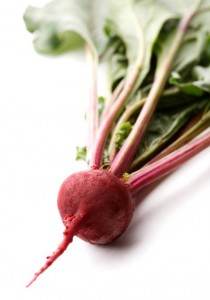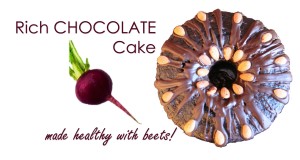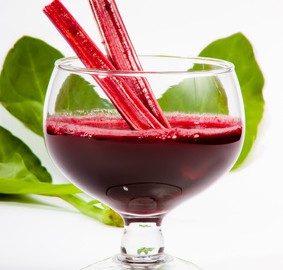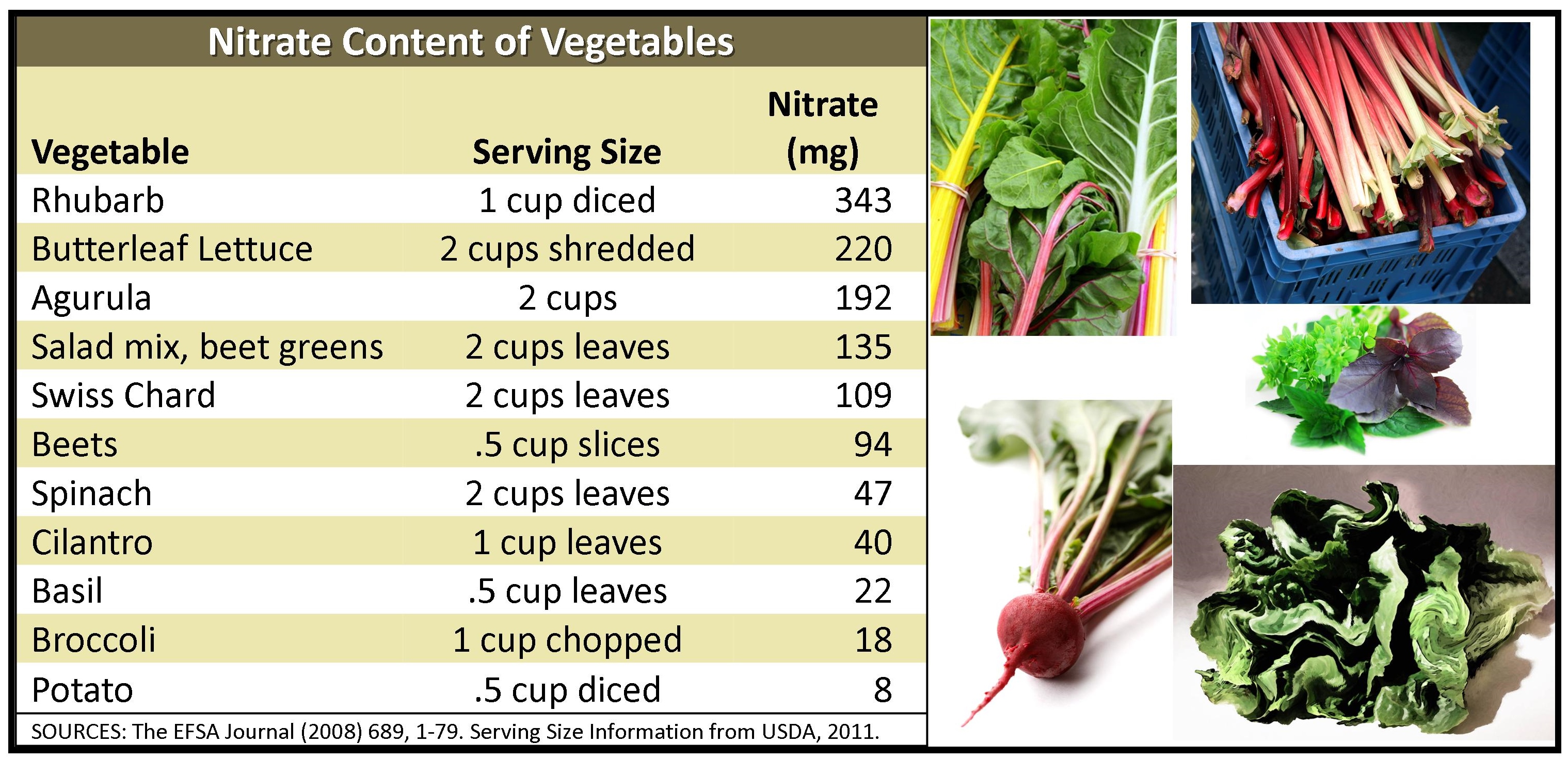I wrote this article in 2012, and since the science of nitrates in vegetables on health and athletic performance has continued to evolve, with many promising studies. See this page for newer updates on dietary nitrates, sports performance, and health.
One race morning, I noticed my XC Ottawa teammates Karl and Megan drinking beet juice. I’d read some of the research, but now I was intrigued. Apparently they were tipped off by their friend Dylan Wykes. Dylan, along Reid Coolsaet and Eric Gillis represented Canada in the Olympic Marathon in London, and incorporated beet juice into their nutrition plans in the lead-up. So have some top pro cycling teams. The list goes on. Some experts believe doping control will be dealing with many red-colored urine samples from endurance athletes (more on this later . . . .). It was clearly time to investigate further.
The research behind beet juice and performance is compelling. A series of small but mostly well-designed studies have associated beet juice consumption with improved exercise performance. It seems beet juice allows your muscles to perform the same amount of work while using less oxygen, somehow making your body’s energy production more efficient. Here are some of the main findings:
- beet juice increased time to exhaustion: cyclists who drank beet juice could ride 16% longer than without beet juice in their diet. The beet juice also allowed them to increase intensity with less oxygen cost.
- beet juice improved performance (1-3%) and power output in 4k, 16k, and 10k cycling time trials. For perspective, if you run a 5km in 20 minutes, a 2% improvement is 19:36 – impressive!
- in walkers and runners, beet juice reduced the oxygen cost of walking and moderate and intense running, and increased time to exhaustion
- runners who ate baked beets before running a 5km time trial ran faster (and the last 1.8 km 5% faster), and had a lower rate of perceived exertion during the first part of the run.
- trained divers could hold their breath almost half-a-minute longer if they drank beet juice before their dive.
- in well-trained rowers, beet juice improved times for a set of 6 x 500m repetitions, especially the later repetitions.
What’s the magic ingredient in beets?
Beets contain many health promoting substances, including the antioxidants betalain, resveratrol, and quercetin. But several studies have revealed that nitrates are responsible for the performance benefit of beets. Juice manufacturer Beet it now produces a nitrate-free beet juice allowing researchers to have a perfect placebo, and indicating that other compounds in beets aren’t responsible for the performance benefits. Although the underlying mechanism is still unclear, recent research has shed light on what’s happening.
Our bodies convert the nitrate in beets to nitrite, some of which is converted into nitric oxide. Nitric oxide’s role in regulating blood pressure and promoting cardiovascular health is well-established, and research continues to uncover its many health-promoting roles in our body. Nitric oxide regulates vasodilation, relaxing blood vessels and improving blood flow, which could allow more oxygen to reach the muscles. Additionally, it seems that nitric oxide helps muscle mitochondria become more efficient. And a recent study showed that mice on nitrate-rich diets had fast twitch muscles that produced more force than mice on nitrate-free diets.
But aren’t nitrates bad?
Until recently, nitrates were considered toxic, and long-term exposure thought to increase cancer risk, which is at odds with the growing body of research highlighting the protective effects of vegetables, many of which are nitrate-rich. In fact, dark leafy greens, which are the richest vegetable sources of nitrates, are all-stars when it comes to promoting health. Many experts question these early studies, and now believe that the naturally occurring nitrates in vegetables may be responsible for some of the cardiovascular benefits of vegetable-rich diets. It’s important to remember that nitrates in vegetables occur naturally and come packaged with a host of health-protective compounds (minerals, vitamins, antioxidants).
Do I need to drink beet juice to get nitrates?
Most of the studies used beet juice, likely because it’s consistent with other studies, has stable nitrate levels, and has a good placebo (nitrate-free beet juice). Would regular beets (not juiced) have similar effects? Juiced beets allow you to ingest a large quantity of nutrients quickly, and may be more readily absorbed, but evidence suggests that regular beets would have performance benefits as well. Apparently, baked beets improve performance and beet-enriched bread can lower blood pressure, suggesting that nitrates from non-juiced beets also have physiological effects.
What about other nitrate-rich vegetables?
Although not investigated for performance, it’s highly possible that other nitrate-rich vegetables would have similar effects to beets. One study found that a diet rich in traditional Japanese foods (plenty of leafy greens) increased plasma nitrite levels and lowered blood pressure, showing that high-nitrate vegetables other than beets may also increase nitric oxide levels.
Vegetables high in nitrates include . . .
rhubarb, arugula, spinach, celery, cress, chervil, lettuce, beets, chinese cabbage, endive, fennel, kohlrabi, leek, and parsley.
Leafy greens are some of the best nitrate sources. By weight, arugula is the clear winner, boasting 480 mg nitrates/100g (almost twice as much as a cup of beet juice). But that’s 5 cups of arugula. . . so here are some nitrate levels based on more reasonable serving sizes. Note that nitrate values are approximate, since content varies considerably depending on soil, location, time of year, and other variables.
You can get an idea of the nitrate content of other vegetables in this table or this publication. Remember – a health-promoting diet should include nutrients from a variety of vegetables, so don’t limit your vegetable intake to high-nitrate varieties. Consider that broccoli and carrots, which are low in nitrates, offer plenty of disease-fighting nutrients.
How much beet juice did studies use?
Performance benefits were found when study participants either drank 500 ml beet juice for 4-6 days, and also for a single 500 ml dose 2.5 hours before exercise testing (500 ml juice reportedly contained about 380-500mg nitrate). More recent studies have tested concentrated beet juice shots (70 ml, about 300 mg nitrate), which seem to be more popular with athletes. A recent study found that consuming just 100 mg nitrate reduced blood pressure, but these researchers didn’t investigate exercise performance.
Seeing Red? Some people notice red urine after eating beets. This condition is harmless, and occurs when beet pigments enter the bloodstream before digestive bacteria break them down.
Recommendations
Although beet juice has shown promise at improving exercise performance, larger scale studies in more diverse populations are needed (for example, more studies in highly trained athletes and females – most studies looked at young male recreational athletes). Also the safety and effectiveness of ingesting high levels of nitrate from one type of vegetable for extended periods is not known. Do not consume commercially available nitrate or nitrite salts, which can cause potentially life-threatening conditions.
A safe bet is to always include a wide variety of vegetables in your diet (high and low nitrate), which have proven health benefits, and consider increasing the proportion of high nitrate containing vegetables closer to important training blocks or events. For non-beet options, eat pre-race meals that are rich in nitrates (e.g., big salads, greens, tabbouleh, spinach lasagna), or add rhubarb to your morning oats (according to this study, oats might help enhance nitric oxide production too).
 For a tasty way to incorporate beets into your diet, try this delicious chocolate beet cake, adapted from our cookbook Food for Thought: Healing Foods to Savor).
For a tasty way to incorporate beets into your diet, try this delicious chocolate beet cake, adapted from our cookbook Food for Thought: Healing Foods to Savor).
See this page for newer updates on dietary nitrates, sports performance, and health.
More Sports Nutrition Articles
- Nutrition Strategies for Health and Athletic Performance
- Dietary Nitrates, Sports Performance, and Health
- Athletes Avoiding Gluten and Grains: Is There Good Evidence?
- The Iron Needs of Athletes: Who Needs More, and How to Get it Through Your Diet
- Healthy or Hype? Chocolate Milk for Recovery
- How Much Protein Do You Need?
- What Should I Eat Before I Workout?
- Energy Bars: What to Look for, Real Food Alternatives, and How to Make Your Own
- Will Beet Juice Improve Endurance Performance?
- Refueling for Recovery
- You Fuel your Workouts, but How Does the Rest of your Diet Stack Up?
Share This:

